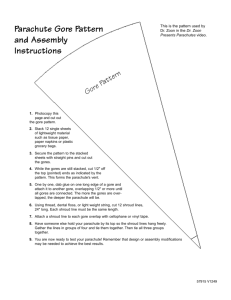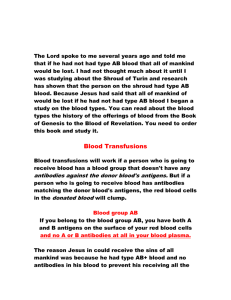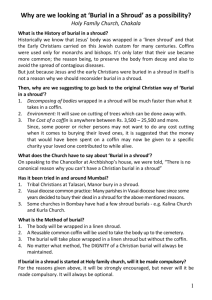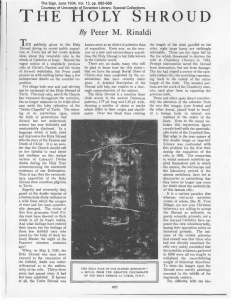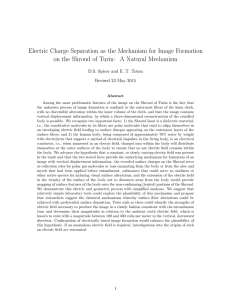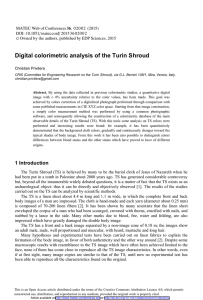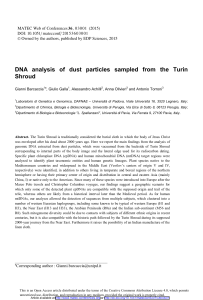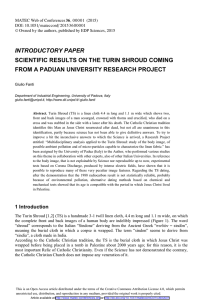Shroud of Tourin - University of St. Thomas
advertisement
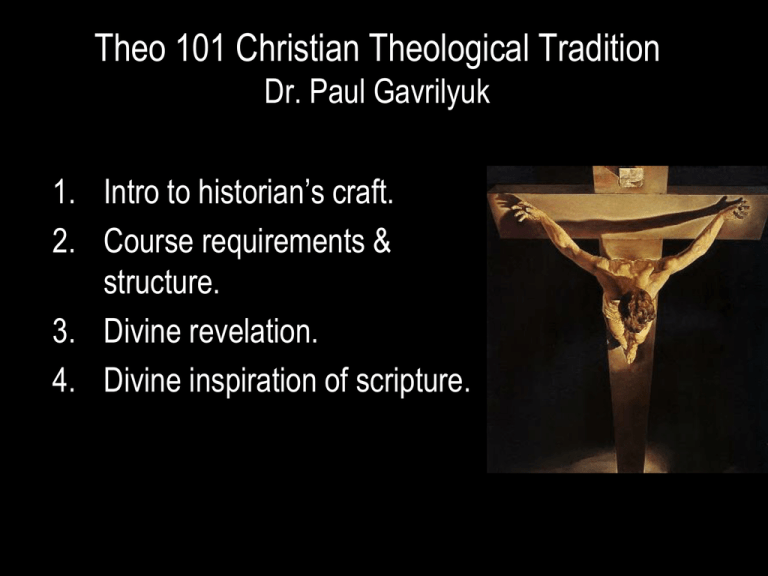
Theo 101 Christian Theological Tradition Dr. Paul Gavrilyuk 1. Intro to historian’s craft. 2. Course requirements & structure. 3. Divine revelation. 4. Divine inspiration of scripture. Shroud of Turin • Mk 15:46: “Joseph bought a linen cloth, and taking down the body, wrapped it in the linen cloth, and laid it in a tomb that had been hewn out of the rock.” Lk 24: 12: “But Peter got up and ran to the tomb; stooping and looking in, he saw the linen cloths by themselves.” Face of Christ on the Shroud of Turin Icon of Christ (6th c) compared to the Image on the Shroud 12 Mandylion & Shroud compared Domenico Fetti, The Veil of Veronica, c. 1618/1622 The fourth crusade evidence Questions types of tests findings/ conclusions What is depicted? photography Image looks like a negative. Bruises on the forehead and breast. Blood on the wrists, perhaps from nails (authentic). criminology Blood from nails is not on the palms of the hands, unlike most Medieval images. Blood is on the wrist. The shroud image is anatomically accurate. It was not based on medieval paintings. No signs of decay of the body (authentic). Who could this possibly be? Biblical record Jn 19: 40, 20: 5-6. The cloth is left after the disappearance of Jesus from the tomb. Place? micro-biology Pieces of pollen from different plants where found on the surface of the shroud. Their corresponding habitats intersect in Jerusalem (authentic). Nature of image? Is it a painting? chemical analysis No traces of paint found (authentic). The cloth was damaged by fire in the 16th c. Date? Physics: carbon – 14 testing. history Historical record? history, archeology Approx date of 1260-1390. A small sample, damaged by fire, was used. Some scientists think carbon-14 dating is unreliable (fake) Pieces of cloth like this were used in the 1st c. Palestine. Problem: no image of any kind on those ancient cloths (authentic) Image of Christ “Not made by Hands.” Veronica’s handkerchief. Mandylion. King Abgar of Edessa legend. Problem: these are facial, not full-body images. Mandylion travels from Edessa to Jerusalem, Constantinople. Stolen from Constantinople in 1204. Recovered as Shroud in the estate of Geoffrey de Charny, who was a relative of the famous knight Templar, executed in the beginning of the 14th c. (authentic?) First know exposition of the Shroud was held in Lirey, France, in 1353/5. this agrees with carbon-14 dating (fake). No record of its veneration in the second century. No record in the fourth-fifth centuries which were known for their archeological findings (fake). There were lots of forgeries in the Medieval period. (fake). The remains of the recently discovered first-century shroud in the Old City of Jerusalem do not match the texture of the Turin Shroud (fake) How did the image get on the shroud? Bottom line: we do not know. A miracle? Super fast Radiation (purely speculative)? If it is a forgery, we cannot reproduce it. Shroud’s Lessons • Historian’s task: the search for “what really happened.” • Theology is the forum for all sciences • God respects our freedom • Believers are invited to become like a shroud Course requirements • • • • • • • • Participation, participation, participation And participation again! Quizzes First paper Exam 1 Course web site Second paper Exam 2 Course structure • Bible – Old Testament – New Testament • History of Christianity, periods: – – – – Early Middle Ages Reformation Modernity Divine Revelation • General – Through nature – Through conscience • Special (some examples) – In prophecy – In mystical experience – In history Divine inspiration of the Bible: three views 1. Verbal inspiration (inerrancy, fundamentalism). 2. Secular view. 3. Middle position.

